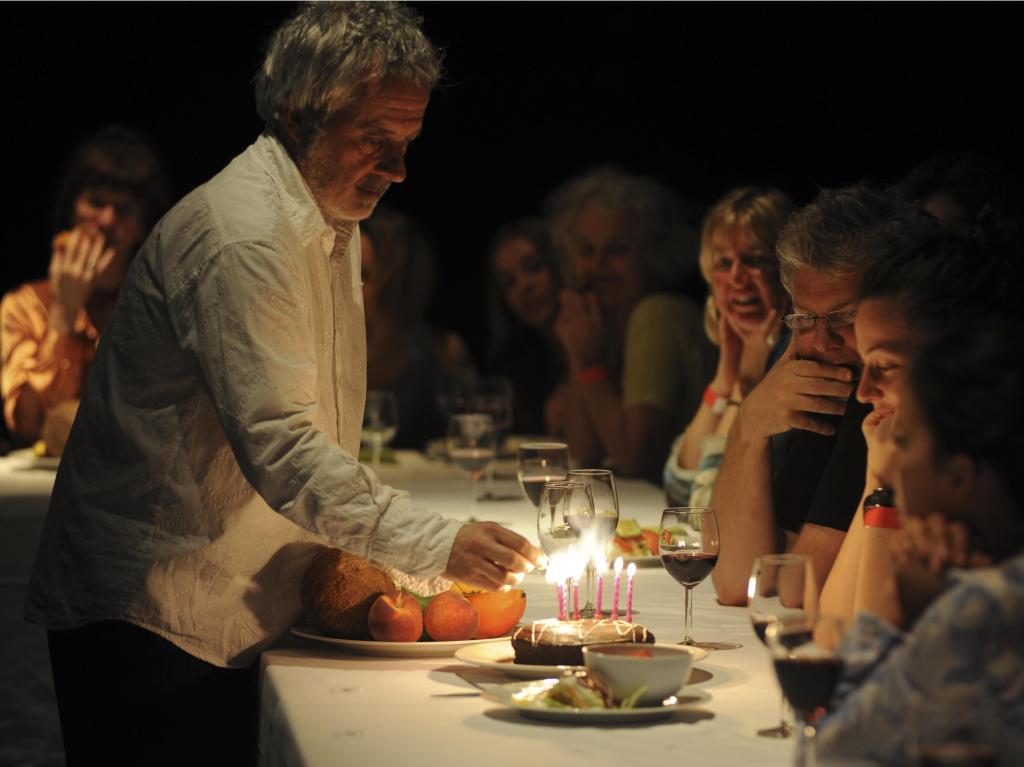Photo by Heidrun Löhr
It seems fitting that this meditative work about last words and last meals takes place beneath the darkened stained-glass roof of the NGV’s Great Hall. A riot of colour designed by Australian artist Leonard French, were the stained glass ceiling lit, its vibrancy would distract from the solemn ritual of Reckless Sleeper’s The Last Supper. As it is, with the hall in darkness, the quiet and cavernous space, reminiscent of a medieval dining hall, somehow amplifies the potency of the performance – though the acoustics of the venue are less than ideal.
Around four linen-topped tables, an audience of 39 people (13 at each table, with the fourth reserved for the performers – Leen Dewilde, Tim Ingram and Mole Wetherell) gathers for a work that connects the last words of the famous and infamous – Rasputin and Napoleon, Marilyn Monroe and Franz Kafka, Princess Diana and Jesus Christ – with platters of food served at intervals to select members of the audience, each dish the final meal requested by a prisoner prior to their execution: chilli-dogs, cheeseburgers, fruit platters – even empty platters representing some prisoners’ more ephemeral requests: world peace, love, and harmony.
One by one, the deceased’s final words are read aloud from the rice paper on which they’re inscribed before being consumed by the performers. Conversely, the food remains untouched, perhaps because audience members have been trained not to eat during a theatrical performance – or perhaps because of the ritualistic way in which the meals are served. With the executed prisoners’ voices absent, these meals speak for them, almost become them; their base ingredients transubstantiated by art.
As the work progresses, The Last Supper becomes a work of imagination as well as memorialisation: fictional voices appear, and the litany of last words ventures away from fact into the realm of imagination. Some final moments – such as the famous last lines of the Wicked Witch of the West – are comic, others tragic. The brutal deaths of the Romanovs, the Russian imperial family; and the banal yet touching litany of imagined last words ascribed to the inhabitants of Hiroshima on 6 August 1945, are especially haunting.
Throughout, the piece avoids bathos, presenting its potentially histrionic elements calmly, save for the occasional dramatic flourish played as often for laughs as for tragedy. But despite its simplicity, The Last Supper is a work of considerable emotional weight. The litany of names and words, the procession of last meals, invites us to think about loss in a real and tactile way; to contemplate our own legacy, and what might be remembered of us after we die.
Rating: 4 stars out of 5
The Last Supper
By Reckless Sleepers
Written by Mole Wetherell
Sound Design by Gerrit Valckenaers
Performed by Leen Dewilde, Tim Ingram, Mole Wetherell
Presented by Malthouse Theatre
Great Hall, National Gallery of Victoria
malthousetheatre.com.au
1-12 July





